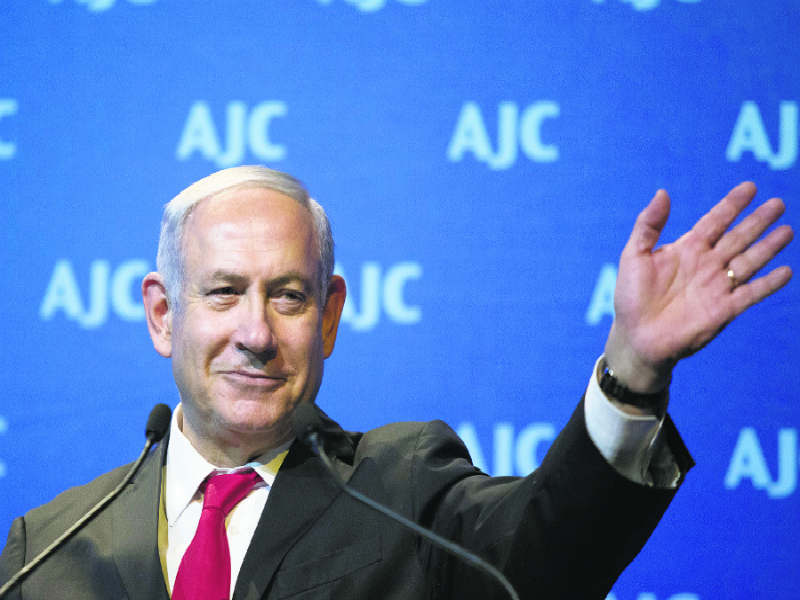Last Sunday evening, Israeli Prime Minister Benjamin Netanyahu urged Diaspora Jews to visit the pluralistic prayer platform at the Western Wall, though he made plain that his government will continue to suspend a 2016 decision to guarantee non-Orthodox Jews permanent access for pluralistic prayer at the wall.
“Before anything else, Israel is the home of all Jews. Every Jew should feel at home in Israel. This is our goal. This is our policy,” he said on June 10, at the opening session of the American Jewish Committee (AJC) Global Forum, in Jerusalem.
“That’s why I hope you’ll visit the pluralistic prayer space at the Western Wall. You should visit it. We’re enlarging it. We’re making it accessible, so anybody can pray at the Western Wall,” he said to considerable applause from hundreds of conference-goers, hailing from Diaspora communities across the globe, in the capital’s International Convention Center.
As part of a January 2016 agreement, which the cabinet approved after four years of negotiations, the government committed to renovating the so-called “Ezrat Yisrael” prayer platform physically. However, the deal also included building a common entrance to the Western Wall for three prayer areas – the Orthodox men’s and women’s section and the “Ezrat Yisrael” plaza, where men and women can worship together – and for representatives of non-Orthodox streams of Judaism to share in the joint oversight of the pluralistic prayer area.
In June of that year, after some ultra-Orthodox websites started to criticize the agreement, the cabinet voted to suspend it, backing away from what was perceived to be a degree of recognition for non-Orthodox streams of Judaism.
READ: THE TWO SIDES OF BENJAMIN NETANYAHU
The government’s freezing of the deal led to a bitter crisis in Israel-Diaspora ties, with many representatives of world Jewry saying they felt “betrayed” by the Jewish state.
But on Sunday evening, Netanyahu was eager to convince the AJC delegates that there was no need for them to be angry at his government.
“The unity of our people is something that is important and transcends daily politics. It’s not always amenable to daily politics, but it’s in our hearts. It’s in my heart. I know that we’re one people. I know that we share a common path and a common destiny,” he said.
He reiterated that point several times during his speech. “Anyone here is welcome. Welcome. Feel free to come here. Feel free to pray,” he said. “When you touch the Wall, know this truth: this is your home. And this will always be the home of every Jew.”
During his 23-minute-long address, Netanyahu also addressed the Iranian nuclear threat, drawing a parallel between the pact, which six world powers struck with Tehran in 2015, and the upcoming summit between U.S. President Donald Trump and North Korean Leader Kim Jong-un.
“We know that in two days, President Trump will meet Kim Jong-un. I think the entire world, as we do, prays for the success of this effort,” he said. “Now imagine that President Trump would come back with some deal, and Britain, France and Germany would applaud it, and South Korea and Japan would say that it endangers their existence. You’d think he’d listen to us, right?”
The same thing happened with the Iran deal, Netanyahu argued.
“This deal was applauded by many in the international community who are not in the missile range of Iran. But Israel and Saudi Arabia and others said: this deal will ultimately give Iran a nuclear arsenal and they will use it first against us, and then with the long-range missiles that they’re building, and that the deal doesn’t prevent them from building, against everyone else,” he said.
“I think, as I told my friends in Europe this week, when Israelis and Arabs agree on something – pay attention! They must know something!
Jerusalem is committed to preventing Iran from acquiring a nuclear weapons and to rolling back Iran’s aggression in the region, Netanyahu vowed.
“We will not let Iran entrench militarily in Syria to threaten Israel, as they openly say they will,” he said. “We’re acting in self-defence but in so doing we’re also protecting the entire world from Iran’s aggression, and we will continue to do so.”
